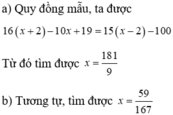
Hãy nhập câu hỏi của bạn vào đây, nếu là tài khoản VIP, bạn sẽ được ưu tiên trả lời.


3x2 + 2x - 1 = 0
=> 3x2 + 3x - x - 1 = 0
=> 3x(x + 1) - (x + 1) = 0
=> (3x - 1)(x + 1) = 0
=> \(\orbr{\begin{cases}3x-1=0\\x+1=0\end{cases}}\)
=> \(\orbr{\begin{cases}x=\frac{1}{3}\\x=-1\end{cases}}\)
x2 - 5x + 6 = 0
=> x2 - 2x - 3x + 6 = 0
=> x(x - 2) - 3(x - 2) = 0
=> (x - 3)(x - 2) = 0
=> \(\orbr{\begin{cases}x-3=0\\x-2=0\end{cases}}\)
=> \(\orbr{\begin{cases}x=3\\x=2\end{cases}}\)
3x2 + 7x + 2 = 0
=> 3x2 + 6x + x + 2 = 0
=> 3x(x + 2) + (x + 2) = 0
=> (3x + 1)(x + 2) = 0
=> \(\orbr{\begin{cases}3x+1=0\\x+2=0\end{cases}}\)
=> \(\orbr{\begin{cases}x=-\frac{1}{3}\\x=-2\end{cases}}\)
1, \(3x^2+2x-1=0\Leftrightarrow3x^2+3x-x-1=0\)
\(\Leftrightarrow3x\left(x+1\right)-\left(x+1\right)=0\)
\(\Leftrightarrow\left(x+1\right)\left(3x-1\right)=0\)
\(\Leftrightarrow\orbr{\begin{cases}x+1=0\\3x-1=0\end{cases}\Leftrightarrow\orbr{\begin{cases}x=-1\\x=\frac{1}{3}\end{cases}}}\)
2, \(x^2-5x+6=0\Leftrightarrow x^2-2x-3x+6=0\)
\(\Leftrightarrow x\left(x-2\right)-3\left(x-2\right)=0\)
\(\Leftrightarrow\left(x-2\right)\left(x-3\right)=0\)
\(\Leftrightarrow\orbr{\begin{cases}x-2=0\\x-3=0\end{cases}\Leftrightarrow\orbr{\begin{cases}x=2\\x=3\end{cases}}}\)
3, \(3x^2+7x+2=0\Leftrightarrow3x^2+6x+x+2=0\)
\(\Leftrightarrow3x\left(x+2\right)+\left(x+2\right)=0\)
\(\Leftrightarrow\left(x+2\right)\left(3x+1\right)=0\)
\(\Leftrightarrow\orbr{\begin{cases}x+2=0\\3x+1=0\end{cases}\Leftrightarrow\orbr{\begin{cases}x=-2\\x=-\frac{1}{3}\end{cases}}}\)


(- (x - 3))/2 - 2 = 5(x + 2)/4
=> \(\dfrac{-\left(x-3\right)-4}{2}=\dfrac{5\left(x+2\right)}{4}\)
=> \(\dfrac{-2\left(x-3\right)-8}{4}=\dfrac{5\left(x+2\right)}{4}\)
=. -2x + 6 - 8 = 5x + 10
=> 7x = -12
=> x = -12/7
Các câu còn lại có cách làm tương tự là tính lần lượt trong ngoặc trước, quy đồng về cùng mẫu số để triệt tiêu mẫu và xử lý phần tử số có x như câu đầu tiên em nhé!
Chúc em học vui vẻ nha!
2) Ta có: \(\dfrac{2\left(2x+1\right)}{5}-\dfrac{6+x}{3}=\dfrac{5-4x}{15}\)
\(\Leftrightarrow\dfrac{6\left(2x+1\right)}{15}-\dfrac{5\left(6+x\right)}{15}=\dfrac{5-4x}{15}\)
\(\Leftrightarrow12x+6-30-5x-5+4x=0\)
\(\Leftrightarrow11x-29=0\)
\(\Leftrightarrow x=\dfrac{29}{11}\)
Vậy: \(S=\left\{\dfrac{29}{11}\right\}\)

\(a,x-5\left(x-2\right)=6x\\ \Leftrightarrow x-5x+10-6x=0\\ \Leftrightarrow-10x+10=0\\ \Leftrightarrow x=1\\ b,2^3+3x^2-32x=48\\ \Leftrightarrow3x^2-32x+8=48\\ \Leftrightarrow3x^2-32x-40=0\)
Nghiệm xấu lắm bn
\(c,\left(3x+1\right)\left(x-3\right)^2=\left(3x+1\right)\left(2x-5\right)^2\\ \Leftrightarrow c,\left(3x+1\right)\left[\left(2x-5\right)^2-\left(x-3\right)^2\right]\\ \Leftrightarrow\left(3x+1\right)\left(2x-5-x+3\right)\left(2x-5+x-3\right)=0\\ \Leftrightarrow\left(3x+1\right)\left(x-2\right)\left(3x-8\right)=0\\ \Leftrightarrow\left[{}\begin{matrix}x=-\dfrac{1}{3}\\x=2\\x=\dfrac{8}{3}\end{matrix}\right.\)
\(d,9x^2-1=\left(3x+1\right)\left(4x+1\right)\\ \Leftrightarrow\left(3x+1\right)\left(4x+1\right)-\left(3x-1\right)\left(3x+1\right)=0\\ \Leftrightarrow\left(3x+1\right)\left(4x+1-3x+1\right)=0\\ \Leftrightarrow\left(3x+1\right)\left(x+2\right)=0\\ \Leftrightarrow\left[{}\begin{matrix}x=-\dfrac{1}{3}\\x=-2\end{matrix}\right.\)
\(b,2x^3+3x^2-32x-48=0\\ \Leftrightarrow\left(2x^3-8x^2\right)+\left(11x^2-44x\right)+\left(12x-48\right)=0\\ \Leftrightarrow2x^2\left(x-4\right)+11x\left(x-4\right)+12\left(x-4\right)=0\\ \Leftrightarrow\left(x-4\right)\left(2x^2+11x+12\right)=0\\ \Leftrightarrow\left(x-4\right)\left[\left(2x^2+8x\right)+\left(3x+12\right)\right]=0\\ \Leftrightarrow\left(x-4\right)\left[2x\left(x+4\right)+3\left(x+4\right)\right]=0\\ \Leftrightarrow\left(x-4\right)\left(2x+3\right)\left(x+4\right)=0\\ \Leftrightarrow\left[{}\begin{matrix}x=4\\x=-\dfrac{3}{2}\\x=-4\end{matrix}\right.\)

a) (x – 1)(x2 + x + 1) – 2x = x(x – 1)(x + 1)
⇔ x3 – 1 – 2x = x(x2 – 1)
⇔ x2 – 1 – 2x = x3 – x
⇔ -2x + x = 1 ⇔ - x = 1 ⇔ x = -1
Tập nghiệm của phương trình: S = { -1}
b) x2 – 3x – 4 = 0
⇔ x2 – 4x + x – 4 = 0 ⇔ x(x – 4) + (x – 4) = 0
⇔ (x – 4)(x + 1) = 0 ⇔ x – 4 = 0 hoặc x + 1 = 0
⇔ x = 4 hoặc x = -1
Tập nghiệm của phương trình: S = {4; -1}
c) ĐKXĐ : x – 1 ≠ 0 và x2 + x + 1 ≠ 0 (khi đó : x3 – 1 = (x – 1)(x2 + x + 1) ≠ 0)
⇔ x ≠ 1

Quy đồng mẫu thức hai vế:

Khử mẫu, ta được: 2x2 + 2x + 2 – 3x2 = x2 – x
⇔ -2x2 + 3x + 2 = 0 ⇔ 2x2 – 3x – 2 = 0
⇔ 2x2 – 4x + x – 2 = 0 ⇔ 2x(x – 2) + (x – 2) = 0
⇔ (x – 2)(2x + 1) = 0 ⇔ x – 2 = 0 hoặc 2x + 1 = 0
⇔ x = 2 hoặc x = -1/2(thỏa mãn ĐKXĐ)
Tập nghiệm của phương trình : S = {2 ; -1/2}
d) ĐKXĐ : x – 5 ≠ 0 và x – 1 ≠ 0 (khi đó : x2 – 6x + 5 = (x – 5)(x – 1) ≠ 0)
Quy đồng mẫu thức hai vế :


Khử mẫu, ta được : x – 1 – 3 = 5x – 25 ⇔ -4x = -21
⇔ x = 21/4 (thỏa mãn ĐKXĐ)
Tập nghiệm của phương trình : S = {21/4}



Bình phương 2 vế lên là giải được bạn nhé !
3x2 + 5x + 14 = 5(x + 1)\(\sqrt{4x-1}\)
<=> \(\left(3x^2+5x+14\right)^2=\left[5\left(x+1\right)\sqrt{4x-1}\right]^2\)
Phân tích ra giải tiếp nhé bạn
Nếu phân tích ra tiếp sẽ ra phương trình bậc 4, PT ấy k có nghiệm nguyên